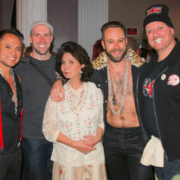Red-faced and feeling contrite, I erred last Sunday.
I rant against mediocrity and plead so ardently for an intelligent performance about real people, who say coherent things to each other.
I ought to salute artists, who gear up for concerts and dig up personal inspiration inside themselves, to motivate them to perform their very best.
And so I wonder why I’m so utterly besotted with God Save the Queen(s).
It billows from clouds of intelligence, endorsed by respected writers and populated by one of the most iconic casts of artists ever assembled.
I feel I should shower it with gratitude — the Gay Men’s Chorus of Los Angeles’ (GMCLA) presentation of God Save The Queen(s) is superbly acted, well-made and something of a rarity.
From a simple tune to the richest harmony, their music exposed emotions in a way that resonated with all of us.
Their command of music brought us together and made us come alive — that brotherhood of men who go beyond being a singing group. They inspire us to make the world a better place.
While the singers get publicity, Musical Director Dr. Joseph Nadeaus also deserves some serious recognition.
God Save The Queen(s) is a journey back in time — from the 1960’s up to the present, we basked in the blooming brilliance of British Rock and Roll.
They relived classic names like The Beatles, The Rolling Stones, Queen and David Bowie, along with more modern wonders like Adele, Seal, Elton and Sade.
The show features tributes to James Bond and Monty Python, in a mélange of characters that were so appealingly played and so pleasing to look at, with their moments of genuinely moving human exchange.
It honors the timeless love that binds every creature in God’s green earth. The cross-class barrier holds together the tradition of the American family.
I can’t remember an ensemble cast with so much emotional power. It’s admirable and I feel that it’s because of a myriad of reasons.
I’ve had the pleasure of having a tête-à-tête with some of them.
Like past encounters with other artists, sometimes the memorable moments happen offstage: in music studios, on practice floors, backstage with the performers or when they are in the audience with their friends, family and colleagues.
Our conversations flourished with our exchanges. I would learn that the GMCLA is one of the country’s largest all-male choruses. It was founded in 1979 as the Benjamin Britten Singers, in what is now called West Hollywood.
It is the first openly gay chorus to tour central Europe (1991); to be broadcast over Russian TV (1999); to tour South America (2006) and to perform for two sitting presidents.
For 35 years, they have been using music to overcome prejudice, teaching students across Los Angeles about acceptance, supporting LGBT, and challenging homophobia and bullying. They expose new communities to their message of equality.
They consistently seek ways to attract new audiences, with new music and arrangements for their choral repertoire.
They make music which aims to reach everyone, with a message of unity.
The GMCLA is a central sustainer of choral singing — one of the world’s earliest known arts yet still holds relevance and appeal in the modern world.
Through sophisticated music-making and enthusiastic community engagement, they seek to retain their roles at the heart of both the gay community and the world beyond. They will continue to sing for a future free of homophobia and all other forms of discrimination and injustice.
Their sweet and harmonious singing brims with honesty and takes us into a sonic ride which stomps, sways and swings into the past and present.







